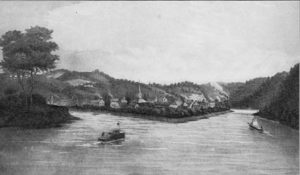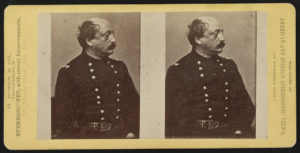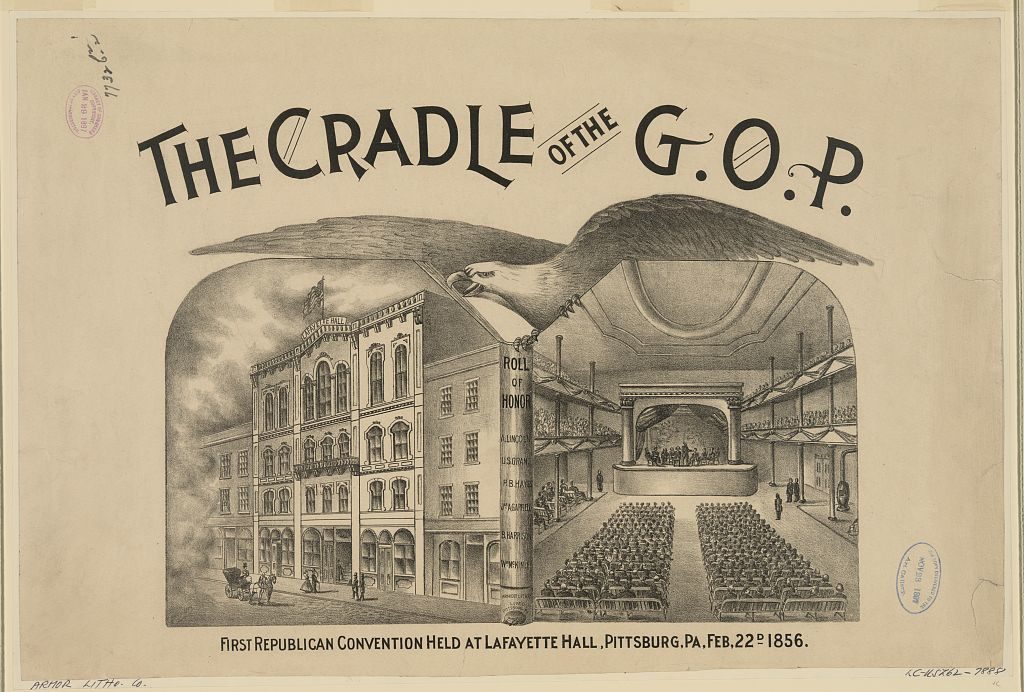About a week after a similar gathering in Cleveland a Soldiers and Sailors Convention met in Pittsburgh on September 25 and 26, 1866. Unlike the Cleveland meeting the Pittsburgh convention was strongly pro-Congress and anti-President Johnson. According to the September 27, 1866 issue of The New-York Times 150 years ago today former Union General Benjamin F. Butler presented the policy resolutions for the convention’s consideration: the 14th amendment to the U.S. Constitution, which “clearly defines American citizenship and guarantees all his rights to every citizen”; it was unfortunate that some people in the country didn’t receive the amendment and other laws in a spirit of conciliation; Congress has the right to make laws for the conquered adversary; the Republican party supports all people everywhere struggling for their freedom and supports the Union men of the South; justice for the volunteer soldiers and officers that served in the war; President Johnson’s claim that he could have made himself dictator “insulted every soldier and sailor in the Republic.” And here is another resolution dealing directly with the president:
Resolved, that the President, an Executive Officer, has no right to a policy as against the Legislative Department of the Government. [Applause.] That his attempt to fasten his scheme of reconstruction upon the country is as dangerous as it is unwise; his acts in sustaining it have retarded the restoration of peace and unity; they have converted conquered rebels into impudent claimants to rights which they have forfeited and places which they have desecrated. If consummated it would render the sacrifices of the nation useless; the loss of the lives of our buried comrades vain, and the war in which we have so gloriously triumphed, what his present friends at Chicago in 1864 declared to be a failure. [Applause.]
The convention adopted all the resolutions.
Here is an 1896 summary that contrasts the Cleveland and Pittsburgh conventions. From The Struggle between President Johnson and Congress over Reconstruction by Charles Ernest Chadsey:
(page 100)
A third convention of the year was the Cleveland convention of soldiers and sailors, organized on September 17, with General Wood of the regular army as chairman. This convention was composed of supporters of the administration, and, like the National Union convention, contained a considerable proportion of Democrats. The resolutions endorsed those of the National Union convention, and declared that “our object in taking up arms to suppress the late rebellion was to defend and maintain the supremacy of the Constitution, and to preserve the Union with all the dignity, equality, and rights of the States unimpaired.”
The great mass of the soldiers, however, were earnest supporters of Congress, and the results of the Cleveland convention were disappointing to its originators; its principal effect was to create great enthusiasm over the anti-administration convention of soldiers and sailors, which met in Pittsburg on September 25 and 26. This demonstration was intended to offset whatever influence the Cleveland convention might have had over the people, and it proved wonderfully effective. It was estimated that at least twenty-five thousand old soldiers were in the city at the time. The cause for this enthusiastic support is not difficult to find. The policy of the administration appealed to the moderates—those who wished as rapid a restoration to former conditions as possible, and those who were most influenced by the appeal to so-called justice. The majority of the soldiers, on the contrary, those who had made the greatest sacrifices for their country, were the most sensitive concerning the results of their sacrifices. Thoroughly accustomed to the thought of their great accomplishments, the manumission of the slaves and the preservation of the integrity of national power, they were keen to resent any steps which they thought tended toward the annulling of these results. With this natural bias, the arguments which the congressional party brought to bear upon them were accepted with enthusiasm; and many of the leaders went into the political campaign to be followed by the same soldiers who had followed them through their military campaigns. The convention, however, was in no sense a convention of officers. While the permanent president, Jacob D. Cox, of Ohio, had been a general of volunteers, the temporary chairman, L. E. Dudley, had been a private, and the majority of the offices of the convention were filled by men below the rank of lieutenant.
As was to be expected from the nature of the convention, the feeling against the administration was stronger and declared in more impassioned tones than in the previous anti-administration convention. Its influence upon the country was correspondingly greater. The army, recognized at this time as the great preserver of the commonwealth, had great influence over all classes of citizens. The anti-administration conventions, the New Orleans massacre, and the violent attacks on Congress by the President while “swinging around the circle,” assured the triumph of the congressional party.
The resolutions adopted at Pittsburgh were presented by General Butler. They were emphatic in tone, commencing with the declaration that “the action of the present Congress in passing the pending constitutional amendment is wise, prudent, and just,” and that it was unfortunate that it was not received in the proper spirit, the terms being the mildest “ever granted to subdued rebels.” The President’s policy was declared to be “as dangerous as it is unwise,” and “if consummated it would render the sacrifices of the nation useless.” The power “to pass all acts of legislation that are necessary for the complete restoration of the Union” was declared to rest in Congress. The declaration of the President to the committee of the National Union convention, that he could have made himself dictator through the Freedmen’s Bureau, aided by the army and navy, was characterized as an insult to “every soldier and sailor in the Republic.” The obligation of the soldiers and sailors to the loyal men of the South was acknowledged; and it was added: “We will stand by and protect with our lives, if necessary, those brave men who remain true to us when all around are false and faithless.”
This, the most successful of the four conventions, completed the remarkable series of national gatherings organized for effect on the State elections. They were all characterized by frankness of statement, and by clear recognition of the points at issue. But, as frequently happens in political campaigns, the most important incidents were those which were not designed to affect national issues. The riot at New Orleans was intended, by its participants, to affect only Louisiana politics, yet all the Southern States were compelled to share the responsibility. The same thing was true of all other incidents through which the South manifested, during these critical months, an unwillingness to accept the political results of the war.



